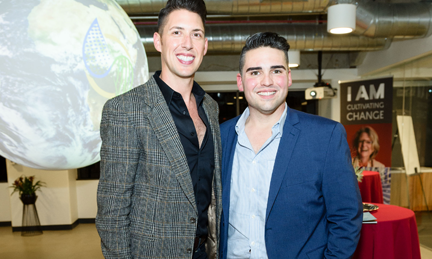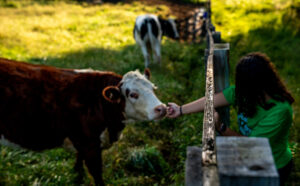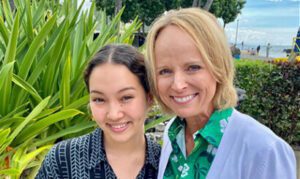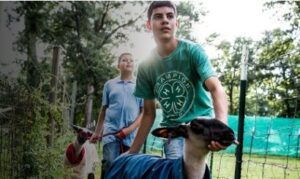One organization that comes to mind is the Cultivating Change Foundation (CCF). CCF is a nonprofit that was founded in 2015 with a mission “to value and elevate LGBTQ agriculturists through advocacy, education, and community.”
In celebration of Pride Month, I wanted to highlight the work of the organization and founding members, Jesse Lee Eller and Marcus Hollan, proud 4‑H alumni. They are using their passion for advancing equity and inclusion in agriculture.
Here is how they are cultivating diversity and inclusion in the agriculture industry.

Marcus Hollan (MH): We wanted a way to proactively keep LGBTQ people in the ag industry and help them feel they belong. The organization started as a passion project for both of us, each growing up in agriculture and rural America.
Jesse Lee Eller (JLE): Marcus and I knew we were not the only young leaders that felt marginalized and isolated within the agriculture industry. We wanted to create a space where people, no matter their sexual or gender identity, could find a home in agriculture and live their authentic lives while serving the agriculture, food, and natural resources industry.
JLE: I’m from a fifth-generation ranching family and grew up in Corning, California, a town noted for being the “Olive Capital of the World.” From raising and showing livestock to farming the land with my parents and grandparents, my passion for agriculture started at a very young age. I’ve taken the valuable lessons learned throughout my time in organizations like 4-H and applied the same grit and work ethic taught to me by my family, to launch Studio 5 Inc.
MH: I was raised in the rural foothills of Yosemite National Park. My passion for agriculture came from growing up with my grandparents, who grew their food and raised their livestock. It was the leadership development skills and opportunities, not agriculture alone, that drew me towards 4-H. Today, I help companies and organizations develop growth journeys for their employees at Studio 5, Inc.
JLE: A basic tenant of the Cultivating Change Foundation is that creating an equitable environment for LGBTQ agriculturalists is vital to the future of global food production.
With the global population set to reach 10 billion people by 2050, there has never been a more important time to be in agriculture. We have 2.5 billion additional mouths to feed over the next 30 years, which means we must increase food production by 60 percent by 2050 to meet demand. Throw in a global pandemic, and now we’re looking at additional layers of complexity.
Ag tech is booming in response to this need. From the heart of Silicon Valley, we see tech startups focused on agriculture popping up and more venture capital firms investing in innovation within the industry. During this boom, Cultivating Change is at the forefront, connecting people, companies, and organizations committed to business equity to support innovative LGBTQ talent and suppliers.
MH: Just as diverse ideas and backgrounds make a local 4-H club more successful in its activities, greater diversity in agriculture is needed for a growing and thriving industry. As agriculture rises to the challenge of producing more food, fuel, fiber, and protecting natural resources, all while making significant technological advancements, we need everyone to feel comfortable bringing their best self to the industry every day.
Several organizations that have studied and evaluated some of the most successful industries and businesses in the world have observed the positive impacts of greater diversity and inclusion. The bottom line: Organizations that are more diverse achieve greater results.
MH: To be more successful, agricultural businesses and organizations across the country strive to develop employees to work more effectively with colleagues from other cultures. When you consider our industry produces, markets, and delivers agricultural products via a multicultural workforce to a multicultural consumer force, it makes sense. Multicultural consumers (members of social minority groups) are predicted to become a majority of the United States population by 2044, which means the majority of the United States workforce will also be multicultural.
4-H members will be leaders in the agriculture industry and other career areas where acceptance and open-mindedness will be a catalyst for gainful employment. As our nation and world continue to grow faint of our agrarian roots, we cannot afford to exclude students—intentionally or not—from leading the industry through innovation and inclusion.
JLE: For those seeking a career in agriculture but feel they may not have a voice: Do your homework. Search for companies and organizations that support and value the things that you hold true for yourself. Research companies and check out their values and mission statements. Check-out if they have employee resource groups, ask what policies are in place that protect employees against discrimination. There is an incredible guide released by the Human Rights Campaign, which shows the equality grade for every fortune 500 and 100 company. The Corporate Equality Index allows all of us the autonomy to choose for which type of company we want to work.
MH: In the earlier years of the foundation’s inception, we often had phone calls with “veteran” LGBTQ+ agriculturists. They heard about the work we were doing and wanted to call and share their stories. Their brave stories were honest, and often included their experience working and living in fear, and without legal protections. In June 2020, the world celebrated as SCOTUS banned employment discrimination for LGBT people. For the first time in US history, individuals can marry who they love without the fear of losing their job.
There is a bright future for anyone that chooses to invest their talents in the agriculture industry. The industry needs you! They need your unique skills, your innovation, and your passion.
















